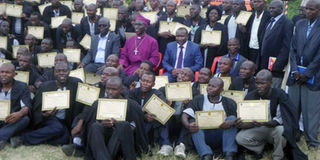Church leaders transform rural communities

Bishop Reuben Kisembo (C)of Rwenzori Diocese poses with graduands after handing them certificates. Photo by Roland D. Nasasira
What you need to know:
MORE THAN PRAYer. Churches are not just houses of worship but places where congregants learn developmental activities, writes Roland D. Nasasira.
In Kirumya Parish in Bundibugyo District, church leaders do not have to wait for political leaders to develop their villages. They believe that the best way through which their communities can develop is when the local church leaders take the lead.
Aidah Kugonza, who was among the 70 trained church leaders through the Theological Education by Extension (TEE) programme that was introduced by World Vision Uganda in Rwenzori region under the church partnership project, says during the training, she learnt how to prepare sermons and how to live in harmony with other people in the community.
“I learnt how to manage families in the community where I stay and also encourage people to be prayerful to overcome any situation,” Kugonza says, adding that the leaders will also plant more churches within the region to experience thorough spiritual community transformation in all corners of the Rwenzori region.
Self-sustenance projects
Unlike Kugonza, Emmanuel Kato says from the training that lasted two years, he will help churches to grow by recruiting more people.
“Most of the churches we have around the community are built out of mud and wattle. With the knowledge acquired from the training, I will preach the gospel of churchgoers starting up income generating activities such as planting more bananas and cocoa for subsistence and commercial purposes,” Kato said. From this, they can make money and contribute resources as a community to help set up churches with permanent structures.
Help families
Vincent Bbale points out that among the other roles that the trained church leaders will do is to move around their communities to counsel couples with misunderstandings so as to create a peaceful environment where children will thrive at school and in exploring their talents, something that can in future turn them into responsible people in their families and communities.
“After creating this kind of safe environment, we expect children to learn to love God and also express it amongst their peers to raise God fearing children,” Bbale concludes. This, he says, sets the foundation for the community to develop if children put God first in everything they do.
Duncan Mugume, Christian Commitment and Church Partnership manager, at World Vision Uganda, explains that churches in the Rwenzori region have in the recent past been seeking ways of reaching out to the communities, given their value, authority, gathering and following that is sustainable and reliable for community transformation. As thus, the organisation came in to make this a success. The bottleneck was that previously, there were few church leaders with a big community to minister to. “We came in and introduced Theological Education by Extension (TEE) programme and trained church leaders to build their capacity with church knowledge to minster to their congregations effectively,” Mugume explains.
The leaders will supplement on the capacity of the church to respond to community issues such as gender, information on HIV/Aids control and prevention, maternal newborn and child health and child protection, and also to put in place systems and structures to engage members of the community from congregational level on issues affecting different communities within the region.
“Church leaders were equipped with leadership and development skills to deal with the spiritual nurture of children and endeavour that their numbers in all churches increase,” he states.
The trained leaders will also introduce Scripture Union clubs in schools where children will engage more with the Bible, be confident to speak for themselves and also become resilient to protect and defend themselves in any situation. To ensure that this becomes a success, all Christian faiths, including Anglicans, Pentecostals, and Catholics take part. The programme was introduced in all regions of Uganda in 2011.
ABOUT TEE
TEE (Theological Education by Extension), is a highly mobile and effective system of training within the local context, based on home and group study led by trained tutors.
TEE came into being in the late 60s, when a residential seminary noticed with great concern that, realistically, they were not training recognised local leaders for the fast growing rural Churches that were springing up all over the country. The recognised leaders were mature men with families and jobs, they simply could not uproot and go away to the seminary. So the first step in TEE was to take the Seminary to the rural churches.
This was a step in the right direction, but it didn’t solve the problem. Professors could not adapt to the simple folk, and the simple folk, although intelligent, could not cope with the work load. So,they had to develop specially prepared study materials for this new method of training.




